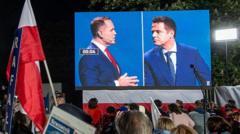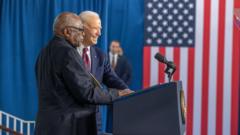The Polish presidential race features two leading candidates, Rafal Trzaskowski and Karol Nawrocki, with a significant likelihood of a run-off due to voter dissatisfaction with the current political landscape dominated by existing parties.
Polish Presidential Election Heads for a High-Stakes Run-Off

Polish Presidential Election Heads for a High-Stakes Run-Off
Voters in Poland face a tight race as liberal Mayor Rafal Trzaskowski and national-conservative Karol Nawrocki prepare for a potential run-off election after the first round on Sunday.
As Poland gears up for a new presidential election, voters are anticipating a closely contested race, which could see a run-off between the current front-runner, Rafal Trzaskowski, and his challenger, Karol Nawrocki. The election, set for Sunday, is reportedly on track to produce a second-round contest on June 1st, reflecting a shift away from the long-standing political dominance of both the Civic Platform (PO) and the Law and Justice (PiS) parties.
Trzaskowski, who presently serves as the deputy leader of the Civic Platform and the mayor of Warsaw, is leading in opinion polls. Nawrocki, a national-conservative historian representing the PiS, trails by a margin of 4% to 6%. The outcome of this election is critical, as the Polish president holds veto power over governmental legislation; the potential for a new presidential administration could shift the balance of political power in the country significantly.
The backdrop to this election follows the end of a controversial era under outgoing President Andrzej Duda, who has served two consecutive terms after switching allegiances from the PiS. Critics have voiced concerns about Duda’s administration, accusing the PiS of converting state-controlled media into platforms for conservative propaganda and undermining judicial independence.
Amid growing discontent, Tusk’s coalition government - which regained power late in 2023 - has come under scrutiny for failing to meet many campaign pledges, particularly regarding abortion legislation. Observers note that while Tusk’s return is seen as a restoration of liberal democracy, his administration's own legal tactics to regain control over public media have raised eyebrows.
In a stark portrayal of the electoral climate, commentators suggest that the upcoming contest isn't a straightforward victory for liberal values but a reflection of a population torn between two polarizing options: a restrictive right-wing populism and a questionable liberalism. As the electoral process unfolds, issues such as migration, LGBTQ+ rights, and environmental concerns remain neglected, leading to broad unease among the electorate.
With rising political tensions exacerbated by regional issues like the war in Ukraine, security has quickly risen to the forefront of political discourse. Each candidate is scrambling to project authority on defense matters, with Tusk announcing plans for a significant defense budget increase and service training for adults within Poland.
Nawrocki has faced increasing scrutiny surrounding his real estate dealings, suggesting that a buy from a senior at a substantial discount could impact his standing. Despite this, opinion polls indicate that neither candidate has yet garnered enough support to secure an outright win in the first round.
As dissatisfaction with the traditional duopoly grows, alternative voices have emerged within the electoral fray, although their support appears to be waning. Among them, the far-right libertarian candidate, Sławomir Mentzen, gained brief traction with young voters but has faltered following controversial comments on sensitive social issues.
The Polish community remains divided, yearning for political transformation amidst a landscape that some describe as repetitive and uninspiring. As voters prepare to head to the polls, the outcome of the elections will undeniably set the stage for Poland’s future and its political identity in the years to come.





















